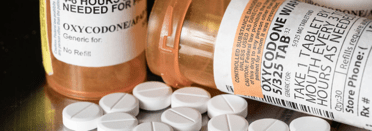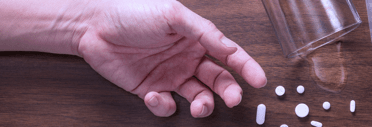Substance abuse in teens is a dangerous problem nationwide. If you are a parent and your teenager is experimenting with drugs, is in the grip of teen drug abuse or has descended into teen drug addiction, you are not alone. However, the challenges associated with drug use in teens must not be ignored. The negative consequences of teen drug abuse are profound.
In truth, the risks of drug abuse in teenagers are much greater than you may expect. Drug abuse is now the number 1 cause of death for teenagers in the United States. Hence, too many young people, who are only kids, are dying. In response to a dire problem, teen drug prevention, teen drug treatment, and teen drug rehab options are needed.
Beyond the risk of teen overdose and the criminal consequences looming, teen drug use opens the door to the chronic problem of teen drug addiction. Indeed, early teen drug experimentation is a threat that must not be ignored.
Drug abuse is now the number 1 cause of death for teenagers in the United States.
According to the Centers for Disease Control and Prevention (CDC), 105 people in the United States die every day from drug overdose.
Vital Teen Drug Abuse Statistics
This list of statistics can help inform parental decisions. Without question, the point is to protect your child. Thus, understanding the extent of the problem of drug abuse is essential.
By knowing the proper teenage drug abuse information, you flip the switch and turn on the light in a dark room. Knowledge is a powerful tool when it comes to helping parents protect their children.

The Stark Statistics of Teen Drug Use
50%
50% of high school seniors do not think it’s harmful to try cocaine or crack cocaine once or twice
40%
40% of high school seniors believe it’s not harmful to try heroin
68%
68% of high school seniors do not view regular marijuana use as harmful
35%
35% of high school seniors smoked marijuana in the past year
60%
60% of teens that abuse prescription drugs access drugs from or through friends and relatives
20%
20% of teens say they have a friend that abuses prescription drugs
Given these numbers, these statistics must open your eyes to the extent of the challenge of teen drug abuse. Indeed, there is no question that drug use in teens has dangerous and lasting effects.
The Dangers of Drug Use in Teens
Still, many adults continue to downplay the dangers and severity of drug use and experimentation. Some adults see substance abuse in teens as merely an experimental phase. Indeed, such people believe the teen drug experimentation will pass without adverse consequences.
Adults in general and parents in particular need to realize that times have changed. In today’s world, the dangers of teen drug abuse are much more extreme. Teens have access to an array of drugs that most parents do not even know about and never imagined. For example, opioid painkillers and ADHD medications are among the most commonly abused drugs by teenagers in the United States.
More teens have died from abusing these prescriptions than have overdosed on cocaine and heroin combined.
Teens may take foolish risks when it comes to experimenting with drugs, particularly prescription drugs. The teen brain rationalizes, telling the teenager that prescription drugs are “safe” because they are not illegal.
Adults in general and parents in particular need to realize that times have changed. In today’s world, the dangers of teen drug abuse are much more extreme.
Drug Use and the Teen Brain
The National Institute on Drug Abuse has proven in recent studies the particular dangers of teen drug use. As Dr. Nora Volkow, Director of NIDA, clearly explains in a cornerstone study:
“Adolescence is a time of major brain development – particularly the maturation of prefrontal cortical regions involved in self-control. Adolescents are prone to risky behaviors and impulsive actions that provide instant gratification instead of eventual rewards. In part, this is because their prefrontal cortex is a work in progress.”
Hence, the teen brain is not fully developed in key areas that help people make wise decisions. Teens are still children growing into young adults. Thus, the teen brain is more susceptible to substance abuse. Hence, it is easy to see how drug use in teens often leads directly to long-term damage and lasting health consequences.
If it seems like we are pulling the alarm and waving the red flag, you are right. Given the number of teens nationwide dying from drug overdoses and putting their future lives at risk, there needs to be a dramatic change in the trend of substance abuse.
Substance Abuse in Teens
The challenge of substance abuse goes beyond the specific drugs being used. Whether your teen is abusing crystal meth (methamphetamines) or marijuana, prescription drugs or cocaine, over-the-counter cough medicine or inhalants, the threat to the teenage brain remains real. Thus, no matter what the nature of drug abuse, parents need to take proactive steps.
In an article on brains in progress, the Director of the National Institute on Drug Abuse understands how parents downplay the seriousness of drug use in teens. As Dr. Volkow expresses, “Though parents may get frustrated by their teens’ poor decisions at times, they usually forgive them — because on some level adults understand that kids’ internal guidance systems aren’t yet fully functional.”
However, forgiving a child for abusing drugs because their teen brain is not fully functional can be done while taking life-saving steps. Appropriate action needs to be taken.
Given the stark reality of the teen drug abuse statistics available to us today, not taking action when faced with substance abuse is unwise. By accessing help for your teen, you can avoid the ugly descent from drug abuse to drug addiction. Moreover, you also can significantly lessen the risk of teen drug overdose. Isn’t this why you want to get help in the first place?
Before detailing the signs of drug use, you need to know the extent of the danger at hand. Indeed, the problem of teenage drug abuse in the United States is spiraling out of control. Today, you can access a strategy that works. Hence, teen rehab and teen recovery services can lead to a solution that results in long-term success.
Before detailing the signs of drug abuse, let’s illuminate the short and long-term effects of drug use.

“Though parents may get frustrated by their teens’ poor decisions at times, they usually forgive them — because on some level adults understand that kids’ internal guidance systems aren’t yet fully functional.”
— Dr. Nora Volkow, Director of the National Institute on Drug Abuse

The Dangerous Effects of Drug Use in Teens
Drug use in teens results in both harmful short and long-term effects. Beyond the obvious danger of teen drug overdose, teen drug use leads to some immediate problems as well.
For example, drugs of any kind reduce a teen’s ability to focus. They immediately affect school performance and could pose a deadly danger if the teen was driving.
Moreover, teenage drug use increases sexual activity and opens the door to sexual predators. Since teens often acquire drugs from adult drug users, they are exposed to a deceitful mix of unsavory characters and criminals.
Also, teens using drugs are much more likely to have unprotected sex, sex with strangers, and sex with multiple partners. Such casual sexual activity places teens at risk for unplanned pregnancy, sexual victimization, and rape.
Also, any unprotected sexual activity can lead to sexually transmitted diseases. From herpes and other venereal diseases to hepatitis C and HIV/AIDS, the health consequences are devastating. Undoubtedly, drug use significantly endangers teens’ well-being.
Further Long-Term Consequences of Teen Drug Use
In truth, many of the long-term effects of substance abuse are problematic in the short-term as well. A chronic disease that appears as the result of drug abuse will be with the teen for life.
For example, using drugs can cause or mask other emotional problems, like teen anxiety, teen depression, bipolar disorder, or schizoaffective disorder, and many other disorders. Indeed, abusing drug exacerbates such mental health problems to the point that they often become chronic.
Moreover, from a general physical health perspective, teen substance abuse is highly dangerous. Drug abuse in teens has unpredictable risks because the undeveloped teen body processes each kind of drug differently.
Indeed, drug use can have adverse effects on each of the body’s systems. Frightening examples of drug abuse health risks include:
- Permanent brain damage from benzodiazepines, inhalants, extended marijuana use, and more
- Heart attack or stroke from stimulants like cocaine or crystal meth
- Halted breathing and heart stoppage from sedatives, prescription painkillers, and muscle relaxants
- A hacking cough and lung damage caused by drugs that are smoked and their unknown additives
- Skin sores and staph infections caused by needle use, and the constant itching and picking that accompanies certain drug use
Tragically, any of these health consequences can result in death. Moreover, even if death is averted, the long-term damage potentially done to internal organs is still serious. Drug abuse has led to heart impairment, brain damage, liver scarring, kidney dysfunction, and more.
Given the dangers of drug abuse, parents are well-advised to know the signs of drug use in teens. Knowing the signs can help you prevent a problem in the beginning, and avoid a catastrophic end.
Signs of Teen Drug Use
Using drugs leads directly to a host of serious problems. From the damage to school performance and lowering of grades to family difficulties at home and potential legal problems, the significant signs of drug use need to be detected as early as possible. Unfortunately, such signs may become apparent when the problem is already out of control.
Beyond drug abuse being the leading cause of death for teenagers, it also contributes to other kinds of teen fatalities. Did you know that drug abuse tends to be the most common factor in teen deaths due to car crashes, suicides, violence, and drowning?
Given the dangers, you need to know the signs of drug use, abuse, and addiction. They include the following:
- Unexpected health complaints like fatigue and exhaustion
- Smell of smoke on breath, on their clothes, or in their room
- Bloodshot eyes leading to the use of over-the-counter eye drops
- A runny nose and redness around the nostrils due to drug inhalation
- Sudden unexplained weight loss combined with a lack of appetite
- Frequent bouts of sudden hunger or “munchies”
- Chronic coughing or hacking like a smoker’s cough
- Poor hygiene and a lack of interest in maintaining cleanliness
- Emotional instability and unexplained bouts of moodiness
- Secretive behavior, locking doors, isolating in their room
Signs of Drug Abuse vs. Typical Teenage Problems
Reading over these potential signs of drug abuse, almost every parent could find something that applies to their kids. In truth, many of these teens are not using drugs. They simply have commonplace teen difficulties.
For example, many teens isolate themselves because they feel alienated. Some teens are secretive because their bodies are in a period of physical transition or have bouts of hypochondria.
Hence, our goal is not to foster unnecessary suspicion or create problems between teens and their parents. In fact, the majority of teens go through high school without developing a drug problem. Although this point is important to make, being alarmist and raising awareness are two different approaches. Thus, parents need to be aware with their eyes wide open.
However, if your teen displays several of these signs without reason, there is smoke, and where there is smoke, there is often fire. Given the threatening flames of teen drug use, taking chances could have disastrous effects. Parents need to put out the danger and protect their children.

About Drug Abuse Prevention
Given the clear-cut danger, preventing drug abuse is necessary. The first step you can take is to talk openly with your teen about teen drug abuse facts. Let teens know what you have learned and help to open their eyes to some of the effects. When talking to a teen about drug abuse and addiction, try to avoid harsh, judging words. Rather, be informative, loving, and supportive, so your teen knows that you are on their side.
From experience, it has been shown that hostile confrontations and loud voices lead to the opposite of what you hope to accomplish. By pushing your teen away from the safety of the family, you open the door for him or her to look for another form of relief like more drug use.
If you feel overwhelmed or uncomfortable about discussing such issues, ask for help from a medical or recovery professional. We’ve provided a toll-free hot line at (855) 823-0616, where trained specialists will be able to help you. You don’t have to do this on your own. Help is available if you are willing to ask for it.
The key is raising awareness and highlighting the importance of education. Indeed, most teens do not know the associated risks. As a result, an essential part of many teen drug abuse prevention efforts is helping teens see and understand the realities and implications of drug abuse.
Strategies to Prevent Drug Abuse
- Be a role model for your teen. As a parent, your attitude toward drug use is a huge influence on your child’s probability of using drugs. If you have a substance abuse problem, please get help.
- Talk to your child early about drug use. By letting your child know what you have learned, you are giving them the knowledge they need to help prevent teen substance abuse.
- Make sure your teen is busy with outside activities after school; sports, jobs, hobbies, and group participation all help.
- Make sure your teen follows the household rules you set in your home. There should be consequences for behavior that needs to change. Such consequences must lead to actual repercussions.
- Be a part of your teen’s life by knowing your teen’s friends and daily patterns of behavior. Also, make sure you know where your teen is at all times. Through such knowledge, you will be much more aware of the myriad of changes that go hand-in-hand with teen drug use.
- Learn about drug use and stay informed. By learning about drugs, what their street names are, and what is popular, you will be able to warn your teen in advance and see the signs if your teen is using them.
Given the challenge of teen drug abuse, these substance abuse prevention strategies are a great place to start. If you discover drug use in your home, the number 1 goal is to help your teen. Indeed, teen rehab can help the entire family.

Teen Drug Rehab Options
Teen drug rehab can profoundly change a young person’s life for the rest of their lives, getting them back on the right track. If your teen has a substance abuse problem, it might not matter whether he or she is only experimenting or if he or she is deeper into drug abuse and drug addiction.
Given the extent of the dangers, it’s important to halt the problem as quickly as possible. By asking the right questions, you will know when teen rehab is the right option for your teen.
Due to the specific needs of teens, drug abuse treatment approaches should be tailored to address your child’s substance abuse patterns, including the particular drug being used. Hence, a professional teen drug assessment is needed to discover the unique needs of your teen.
Also, your teen’s personal history, including related medical, psychiatric, and social challenges need to be included within a drug use assessment. A proper assessment provides needed insight into what treatment options will work best.
For many teens, inpatient residential treatment recommended for a minimum of 30 days is needed to shift teen drug use behavior patterns.
Thus, consulting with an addiction specialist is the right path to take. When it comes to drug abuse and teens, you need to access both experience and expertise to understand in detail your best options and ultimately achieve the goal of safety and security for you and your family. It is possible, and we are here to help.
For many teens, inpatient residential treatment recommended for a minimum of 30 days is needed to shift teen drug use behavior patterns.
Teen Drug Abuse Statistics
60%
More than 60% of high school students report that drugs are kept, sold, and used in their schools
90%
90% of adults who currently abuse drugs or are addicted to drugs began using before the age of 18
1/2
Half of America’s high school seniors have tried an illicit drug by the time they graduate, and 4 in 10 have used drugs in just the past year







